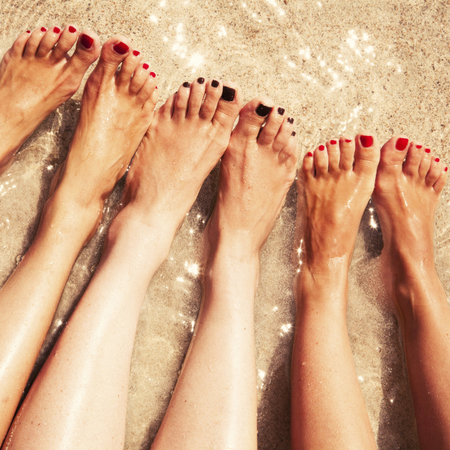Happy International Women's Day! In honor of the occasion, we thought we'd share some foot health information relating particularly to women's feet.
There is quite a marked difference between men and women's feet - women commonly have a narrower heel and broader forefoot, and are generally more flexible in the foot and ankle than men.
Women also suffer more from certain types of foot problems than men. This is can be caused by footwear (for example, wearing and walking in narrow-fitting shoes that have inadequate room for the toes). Problems may also be caused from the prolonged use of high-heels which cramp the front of the foot, shorten the muscles and tendons in the lower leg and ankle, and increase pressure on the ball of the foot - generating a host of foot and ankle problems.
Women may also be more prone to the following foot and ankle problems:
Morton's Neuroma - a thickening of nerve tissue in the ball of the foot resulting from compression and irritation of the nerve. This could be caused from wearing shoes which have a tapered toe, or high-heeled shoes which do not allow enough room for the toes.
Bunions - generally begin with a ‘leaning’ of the big toe, gradually changing the angle of the bones over the years and slowly producing the trademark bunion bump. Bunions are generally caused by a combination of issues (such as an inherited particular structure of the foot which is exacerbated by the way a person walks). Both men and women can get bunions, however the footwear worn by women often makes the issue progressively worse.
Heel Pain and Plantar Fasciitis - heel pain is most often caused by plantar fasciitis. Although a biomechanical foot structure issue is the most common cause of plantar fasciitis, in women, it can be worsened by wearing nonsupportive shoes (such as thongs or ballet flats).
Ankle Spain - whilst anyone can sprain an ankle, women are particularly vulnerable to this injury when wearing high-heeled shoes (particularly on slippery ground), platform shoes or other improper footwear.
Our podiatrists can help not only with diagnosis of any injuries or pain in your feet, but will also work with your GP and other allied health professionals to establish an appropriate management program. We are also able to advise on appropriate footwear and/or shoe inserts which help in reducing pain. If your feet are causing you concern, please get in touch with our team of skilled podiatrists today.


